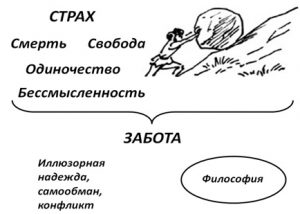First, it is the awareness of mortality. Any person realizes that he will ever die, but everyone has this clearly expressed individual manifestation. Some people believe that cannot escape of this and they continue to live peacefully, while others experience this neurotically. Two mechanisms of protection from this type of alarm can be distinguished, namely: 1) belief in one’s own immortality and 2) belief in a savior.
The next given, which makes me anxious, is freedom. People interpret it differently. A person thinks that he initially comes to a fully organized world and there is not threatened. But actually it is not. Sooner or later a person begins to understand that freedom deprives him of the soil under his feet, the opening of this emptiness comes into conflict with the need for “soil” and its structure; he understands that he is the creator of his world and, accordingly, bears responsibility for it. Mechanisms of protection from anxiety associated with freedom lead a person to a false awareness of the lack of responsibility for himself, for their life choices.

The third ultimate given, referring me to myself, to my basic state of existence, is loneliness. People come to the world and leave it completely alone. This existential conflict is a conflict between conscious of isolation and the need for contact. Mechanisms of protection in this case will be: attempts at self-affirmation at the expense of other people, as well as merging with another person or group.
And, finally, the fourth ultimate given, which is the source of my anxiety, is meaninglessness. The meaninglessness, as well as at a meaning, has set of shades. Here people ask such questions as: “What is the meaning of life, if I will die?”, “Why do we live?”, “How should we live?” The mechanisms of expending the existential potential manifest themselves either in compulsive activity, which allows us to take and structure time, or, most likely, in “revolt” or nihilism, which is so vividly described by Albert Camus.